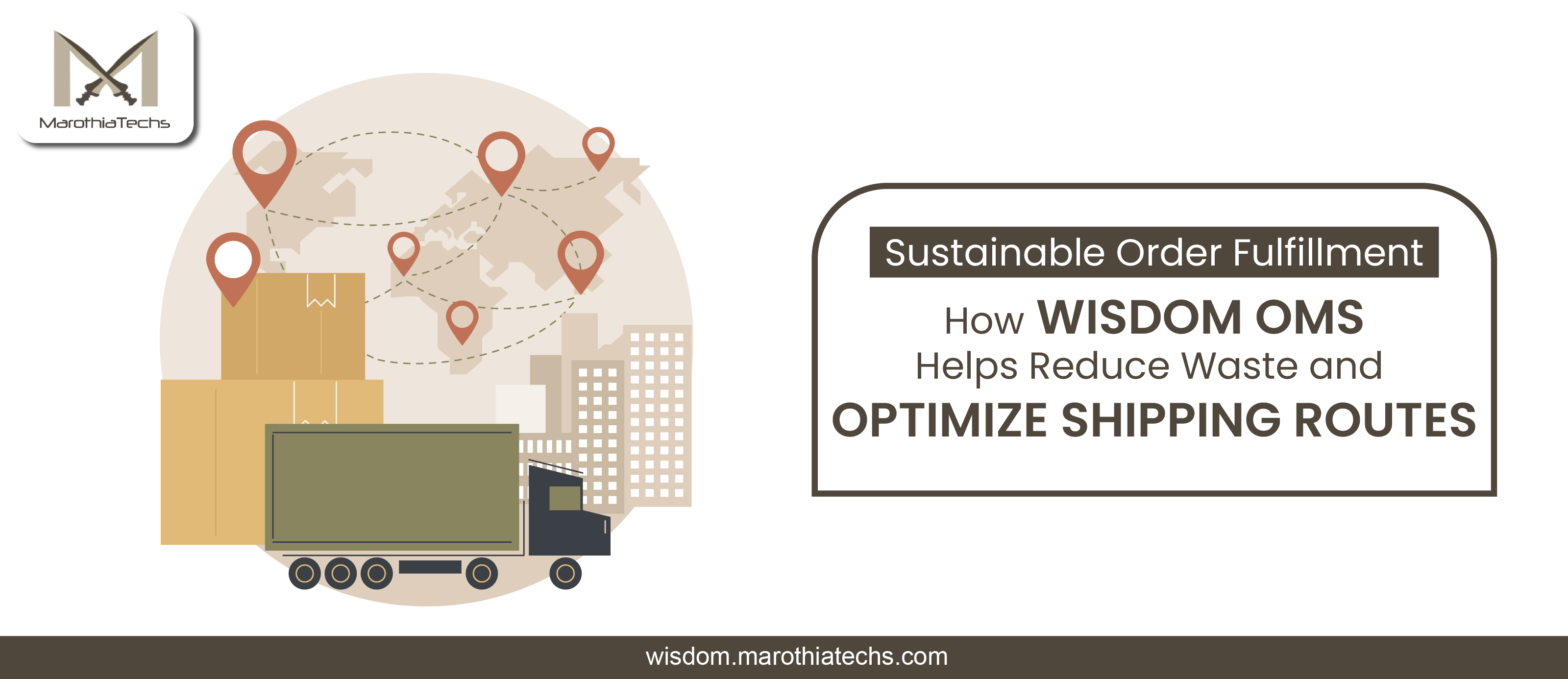World of eCommerce, businesses are continuously striving to enhance operational efficiency, cut costs, and adopt more sustainable practices. A key area of focus for achieving these goals lies in how orders are managed and fulfilled.
Order fulfillment plays a pivotal role in any eCommerce business, but many companies face challenges related to inefficiencies that increase waste and shipping expenses.
This is where a robust system for managing orders comes into play. By refining various aspects of the order fulfillment process, businesses can significantly reduce waste, optimize shipping routes, and boost overall sustainability.
But how does a comprehensive order management system help reduce waste and improve shipping efficiency? Let’s delve into the details.
What is Sustainable Order Fulfillment?
Sustainable order fulfillment refers to minimizing the environmental impact of order processing while improving efficiency across all stages of the order lifecycle.
In traditional order fulfillment methods, inefficiencies such as excess packaging, long shipping distances, and poor coordination can lead to waste, higher carbon emissions, and additional operational costs.
In contrast, utilizing an efficient order management system helps businesses reduce waste, optimize inventory management, and streamline the shipping process, resulting in both cost savings and eco-friendly benefits.
Key Benefits of Reducing Waste with an Order Management System
An essential benefit of any order management platform is its ability to help businesses cut down on waste.
By improving how orders are processed, companies can avoid overstocking, reduce unnecessary production, and ensure that only the required products are shipped.
This results in both financial savings and a smaller environmental footprint.
Key Points:
- Optimized Inventory Management: An effective system allows businesses to track inventory levels in real-time, preventing over-ordering and reducing unsold stock that could go to waste. By adjusting stock levels based on customer demand, businesses can prevent excess inventory that might otherwise end up discarded.
- Sustainable Packaging: Many order management systems provide insights on consolidating shipments or using minimal packaging, both of which can drastically reduce packaging waste. By combining multiple products into one shipment, businesses save on packaging materials and reduce the number of deliveries required.
- Better Forecasting: With accurate data on inventory and past sales trends, businesses can predict product demand more effectively, leading to fewer instances of overproduction or unsold items.
Optimizing Shipping Routes to Reduce Environmental Impact
Shipping is one of the most significant contributors to a company’s environmental footprint. Inefficient shipping routes can result in higher carbon emissions, longer delivery times, and increased shipping costs.
By incorporating an order management system, businesses can better optimize shipping routes, making deliveries faster, more cost-effective, and environmentally friendly.
This system analyzes shipping data and suggests the best routes for delivery, reducing unnecessary detours and long travel distances.
Key Points:
- Efficient Route Planning: OMS platforms help businesses identify the most efficient delivery routes, reducing the need for multiple trips or excess fuel consumption. This leads to lower carbon emissions from transportation, directly benefiting the environment.
- Eco-Friendly Carrier Options: Many systems integrate with carriers that offer sustainable practices, such as electric vehicles or carbon-neutral shipping options. Businesses can choose greener alternatives while maintaining cost efficiency.
- Consolidation of Shipments: Rather than sending multiple deliveries to the same destination, an OMS can help consolidate orders into fewer shipments, reducing fuel use and cutting down on emissions.
Streamlining Operations to Improve Efficiency
A well-designed order management system is crucial for streamlining all aspects of the order fulfillment process.
By integrating functions such as inventory management, order processing, and shipping coordination, businesses can automate many tasks and eliminate unnecessary steps.
This leads to reduced operational complexity and waste.
Key Points:
- Real-Time Tracking: Businesses can monitor the status of orders, track inventory, and manage shipments in real-time. This helps avoid errors, delays, and redundant processes that could lead to waste.
- Automated Order Routing: An order management system can automatically route orders to the most suitable warehouse based on proximity to the customer, reducing shipping time and minimizing unnecessary stock movement.
- Reduced Handling: With more streamlined processes, the need for manual handling and processing is reduced, which lowers the chances of errors, damage, or excess packaging material being used.
Enhancing Customer Experience with More Sustainable Practices
Sustainability isn’t just about reducing waste—it’s also about improving the overall customer experience.
Today’s consumers are more environmentally conscious than ever and are increasingly opting for businesses that prioritize eco-friendly practices.
By optimizing the order fulfillment process, businesses can not only provide better service but also align their practices with the growing demand for sustainability.
Key Points:
- Faster Deliveries: Through improved efficiency and optimized shipping routes, customers receive their orders more quickly, which leads to increased satisfaction.
- Transparency: Many order management systems offer tracking features that let customers monitor their order status in real-time. This transparency builds trust and enhances the customer experience.
- Sustainable Packaging Choices: By choosing to use less packaging material or biodegradable options, businesses show customers that they are committed to reducing their environmental impact.
Achieving Sustainable Growth in Your Business
Sustainability is no longer just a buzzword—it’s becoming an essential part of the way businesses operate.
As environmental concerns rise and consumers demand greener options, companies must adopt practices that reduce their ecological footprint. Using an order management system is a crucial step in achieving this.
By integrating all stages of order fulfillment into one system, businesses can not only reduce waste and optimize shipping routes but also streamline inventory management, minimize excess packaging, and lower their carbon emissions.
Key Points:
- Long-Term Sustainability: A strong order management system helps businesses adapt to growing environmental challenges by reducing inefficiencies and ensuring sustainable practices throughout the supply chain.
- Cost Savings: Reducing waste, optimizing shipping, and improving inventory management leads to cost reductions, which contribute to long-term profitability.
- Improved Brand Reputation: Adopting eco-friendly practices improves a company’s public image, making it more attractive to consumers who value sustainability.
Start Your Journey Toward Sustainable Fulfillment
If you’re looking to improve the efficiency of your order fulfillment process while reducing waste and environmental impact, implementing an order management system is the way forward.
A well-designed OMS helps streamline operations, optimize shipping, and enhance customer satisfaction—all while supporting sustainability goals.Take the first step towards creating a more eco-friendly business. Visit Wisdom OMS to learn more about how our solution can help you reduce waste, improve your shipping processes, and contribute to a greener future.


Leave a Reply